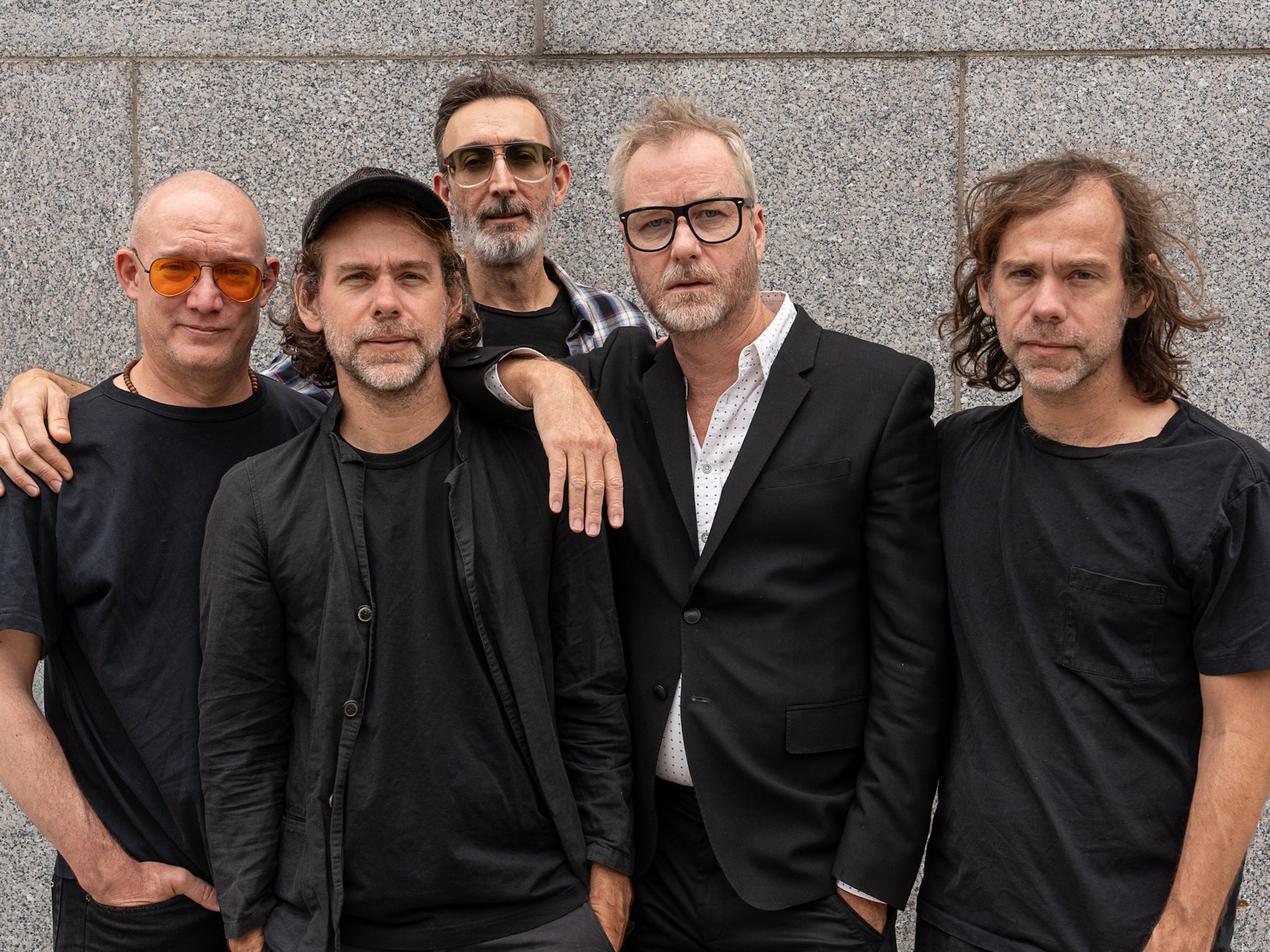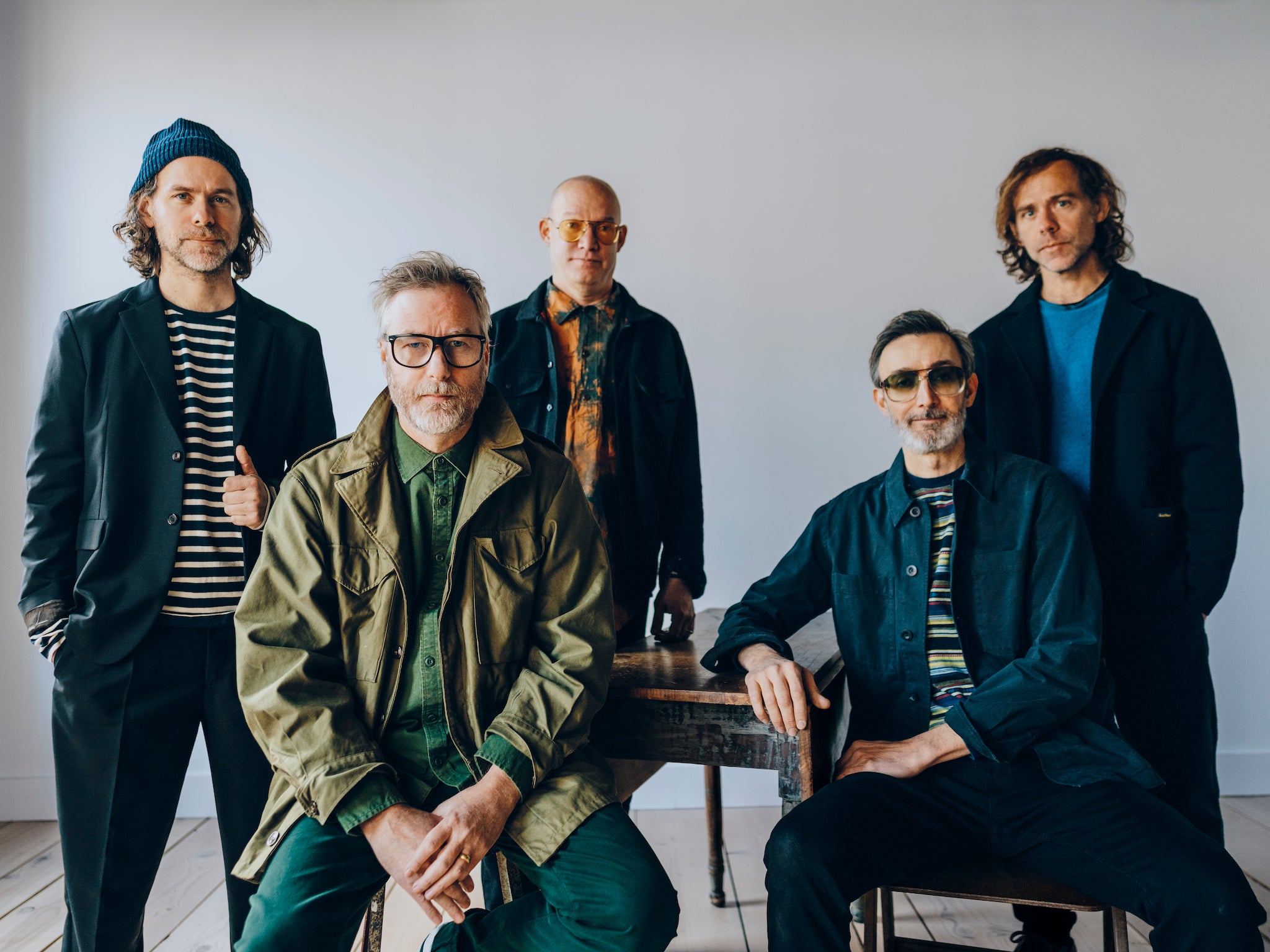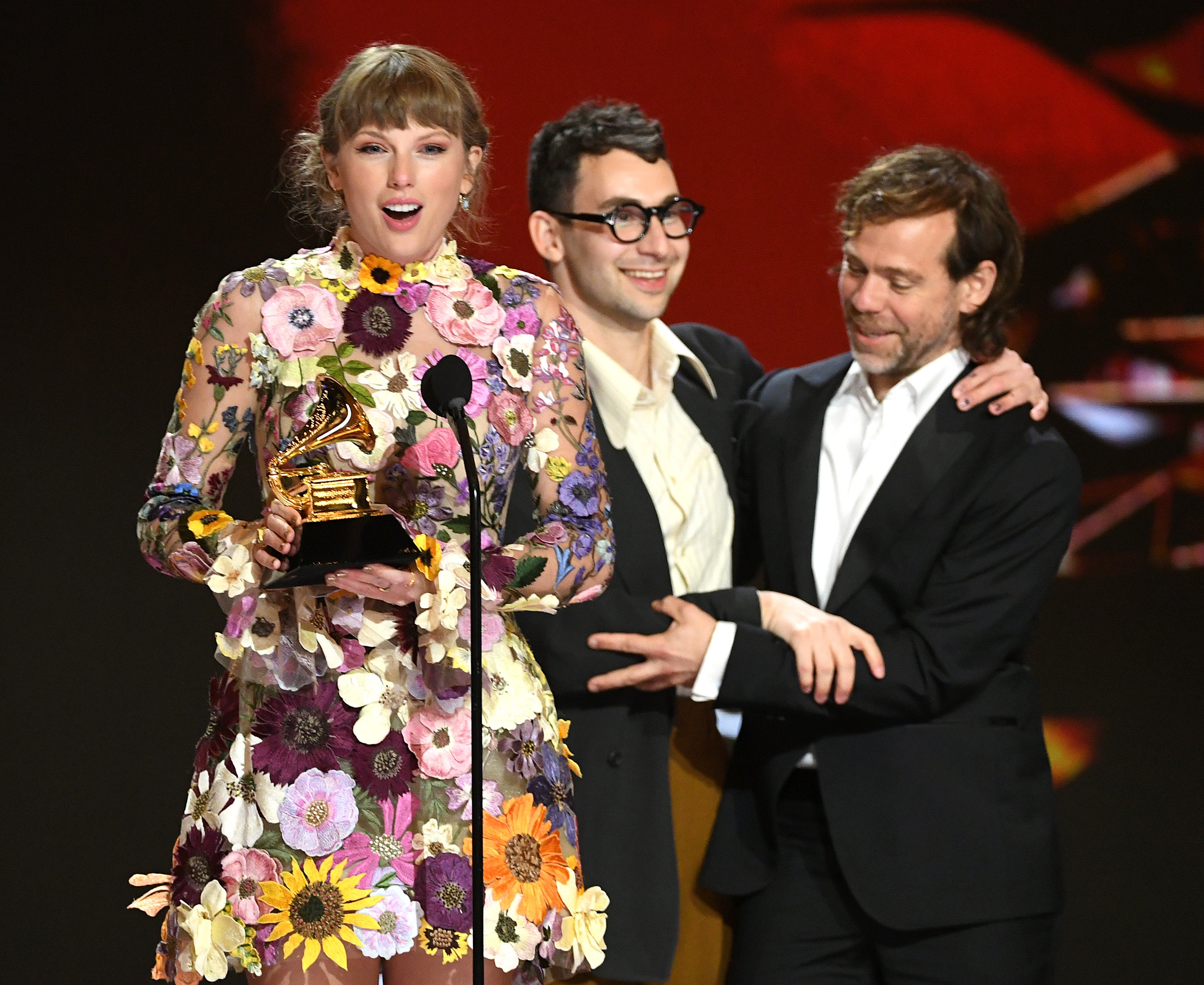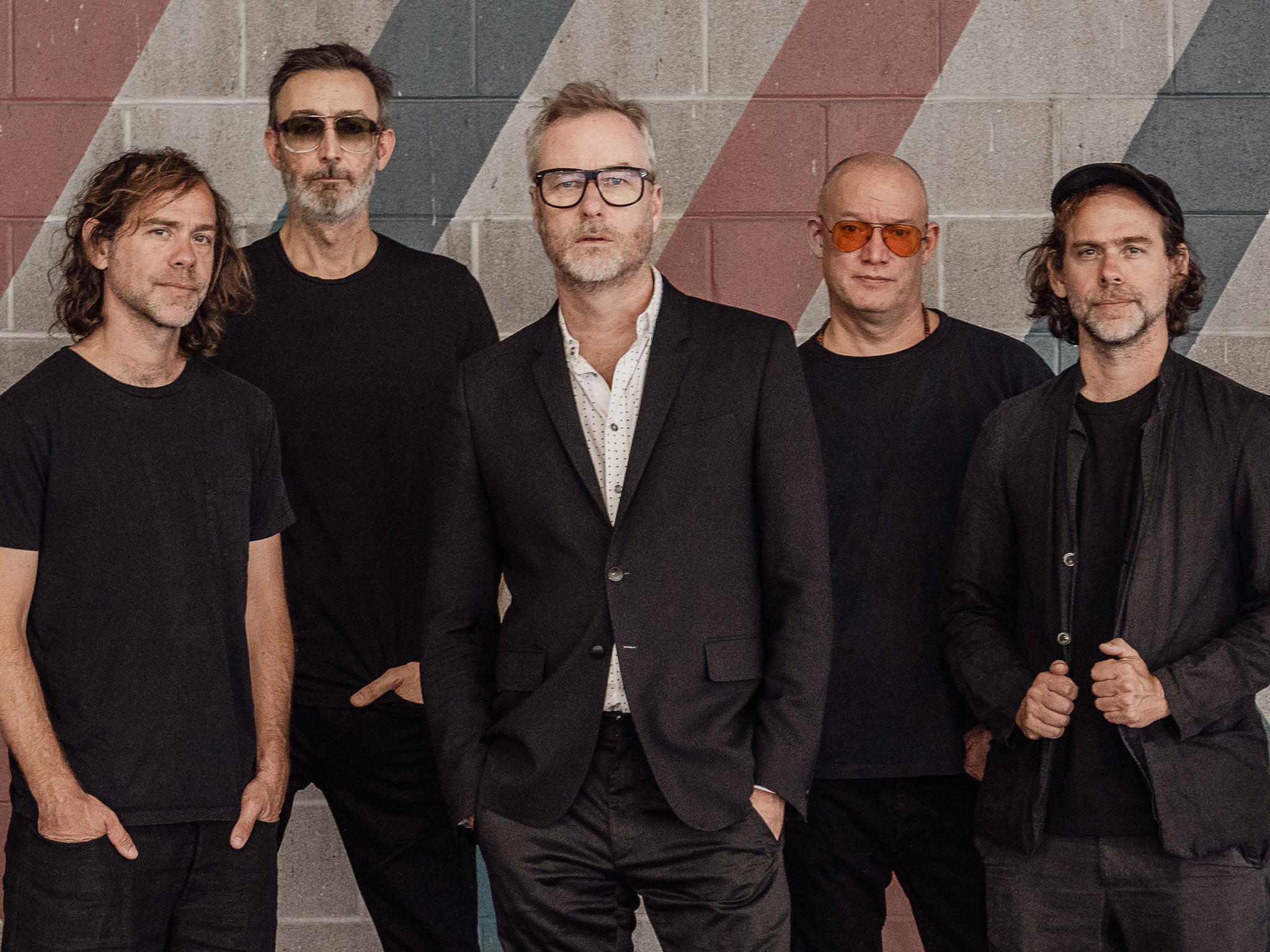The National on coming back from the brink: ‘Everything was evidence of failure’
On the heels of their surprise new album, the American five-piece meet again with Laura Barton to speak about facing depression, bonding as ‘brothers’, and finding ‘joy’ in their ‘incredibly sad’ songs

In the early part of this year, I travelled to Long Pond, the recording studio of The National’s Aaron Dessner, in upstate New York. The eastern United States was still wintering then, and the land held a kind of quietness – one that met, it seemed, the tone of the band’s new record at the time, First Two Pages of Frankenstein.
Across a couple of days, The National’s five members talked of the difficulty of the last few years; the struggle of distance and pandemic lockdowns, of a long stretch in which the future of the band became unmoored, as lead singer Matt Berninger wrestled with depression and writer’s block. Berninger cried as we spoke. For a few moments, we sat quietly in the studio live room while he caught his breath. Outside, the snow lay knee-deep across the fields.
When we speak again, it is a Saturday morning in mid-September. Berninger is in Cincinnati, Ohio, where The National first met and were raised, and where the previous evening the band played the first of two Homecoming shows – a two-and-a-half-hour set that encompassed a performance of their 2010 album High Violet in its entirety, a guest turn from Patti Smith, and Berninger’s announcement that in two days’ time, The National would be releasing a surprise new album, Laugh Track.
Down the line, the singer sounds quite different to the man I spoke to at Long Pond, as if all the colour has returned to his voice. He talks exuberantly of the new record, his family’s recent relocation from Los Angeles to Connecticut, and his shifted relationship with touring. “A year ago, performing was like going to the dentist, it was so hard,” he says. “And maybe I’m on laughing gas right now, but I’m finally enjoying it in a whole new way.”
The National are now 24 years and 16 albums deep into their career. They have racked up Grammys and platinum sales and a reputation as the cerebral liberal’s band of choice, with songs that explore the intricacies of middle-aged and middle-class anxieties, through a combination of Berninger’s baritone wit and music that is somehow both delicate and anthemic. They have forged a vast network of creative collaborators, ranging from Sufjan Stevens to the London Contemporary Orchestra and the choreographer Justin Peck. This past summer, they played Madison Square Garden, and when they return to London next week, they will perform two sold-out nights at Alexandra Palace.
Across those 24 years, there have been various detours – a Berninger solo album, Aaron Dessner’s adventures in pop production for the likes of Taylor Swift and Ed Sheeran, his brother Bryce’s immersion in classical composition and film scores, and LNZNDRF, the more experimental side project of Bryan and Scott Devendorf, the band’s drummer and bassist. Still, it is the band that draws them back and tethers them together; that has acquired, over the past two-and-a-half decades, a sense of geography and belonging. “The National’s like home now,” guitarist Bryce Dessner told me a couple of days earlier, as he sat in Paris’s Charles de Gaulle airport, en route to Cincinnati. “We were a band from Ohio, and then we lived in New York, and then we kind of spread to the wind, but the music and the people involved and Matt’s voice have become like this beautiful family reunion. We’re like brothers and we love each other. It has a kind of depth.”
Laugh Track captures some of this sense of re-congregation. As is the case with all National albums, it includes a variety of collaborators and guest musicians, among them, vocal turns from Roseanne Cash, Phoebe Bridgers and Bon Iver, but, in essence, its sound is a solidification of a band of five. “We were in a position to make two albums and have them be these kind of twins,” Aaron Dessner explains. “But I think there is something about some of these songs where there’s a lot of locomotion in them.” The key, he suggests, was the band’s decision to favour live drums on Laugh Track, rather than the pre-programmed percussion of its predecessor. “When Bryan kicks off and has this incredible momentum it’s like having a wind at your back and it’s really liberating,” he continues. “It’s linear, almost mechanical and incredibly powerful drumming that bounces off Matt’s humanity. I think it’s the strange magic of The National; we all weave around it, but that’s the core tension.”
Berninger has always made a reliably entertaining interviewee. Just as he makes a garrulous frontman, bawling into the microphone and wading out into the crowd each night, so there is something in the manner of his conversation that has always felt buoyant and expansive. In the past, we have discussed everything from abortion rights and American presidential candidates to baritones, capitalism, and the merits of drinking on stage.

When we spoke at Long Pond, there was none of this. No politics, no hypothesising, no examination of what it means to be a “cis white guy” in the modern age. Instead he had disengaged from the world and turned inwards. Conversation itself seemed to bruise him. Today he talks of the slowness of that time, beginning in the midst of the pandemic, “when things were isolated, and disconnected”. He missed live music, the camaraderie of the band, feeling out in the world. “Your brain starts to echo off itself a little bit when you don’t go out and socialise,” he says. “And it lasted such a long time, and the longer it lasted the more paralysed I got. I froze up, and I got worse and worse for a long time.” For many years, he had written songs about the fear of losing connection, and now suddenly that loss had come.
We have almost never just jammed together
Writing the songs for Frankenstein was painful and drawn out for all of them. “Getting back into it, and getting connected again, and getting connected with the songs and getting connected with being able to write again was a slow process for me,” he says. He had tried sobriety, medication, therapy, but in the end, it was the music he heard his bandmates writing that brought him back. On Laugh Track, Berninger’s lines still draw on his time underwater, immersed in that pale and formless depression, but in contrast to the muted fragility of Frankenstein, there is now a levity to the way he tells them. “It has felt amazing to see Matt come back to life,” Bryce Dessner says. “He’s in a great place, and he’s let go of a lot of things that you can hear in the lyrics. It’s like he feels free from how he was and what was burdening him. It’s almost joyful.”
Evidence of Berninger’s rejuvenation came at a soundcheck in Vancouver earlier this summer, when after running through that evening’s set, the band stayed on and jammed. It was something new The National had started to do on this run of dates. “We have almost never done that,” Dessner says. “Maybe in the early, early days of The National, when we didn’t really have our home recording set-up, so then we would just jam in a room.” But this tour felt different, and it was in the spirit of these live shows and the feeling of enjoying being on stage together again, that each day one of the band would start riffing an idea “and then everybody would start playing”.

On this particular day in Vancouver, they had no desire to stop. “It was like surfing a wave or something, where suddenly the thing keeps going,” Dessner says. “There was enough of a dialogue, and enough things coming out and everybody reacting. Something about the looping pattern, and the moments where Bryan breaks down the drums for a second, I think it was kind of a doorway for us to step through.”
Berninger, he recalls, “sort of slinked up to the microphone” and started mumbling some lyrics: “Smoke detector, smoke detector, all you’ve got to do is protect her…” his voice stumbling over and under Devendorf drums. “I think the fact that Matt doesn’t play an instrument means he finds ways with the rhythms of his words which are actually really interesting,” Dessner says. “In a lot of his vocal melodies, it’s like a polyrhythm superimposing a three over a two, or a four over a three. It’s an odd thing where he’s playing over the beat or over the bar – I think he pulls things out of musical phrases and finds ways to do it with his voice.”
In Vancouver, Berninger’s freeform lyrics and polyrhythmic delivery grew into a captivating rant. “And then the thing kind of caught almost like a wildfire that gets out of control. We just kept going and kept going and kept letting it go.” He looked over at Berninger and thought: “This guy’s fully present and fully fearless again.” Whether this fiery magic could ever be recreated on record was the question. In contrast to the incandescence of their live shows, The National’s studio records tend to be careful, finely crafted works, benefiting from much thought and studio time. “But with this one, it felt like, ‘Let’s let it be what it is,’” Dessner says. “Because when people come to hear us play, we do that. We leave it all out there and really go for it, so it felt fun to try that on a record.”

After spending so long unable to write, Berninger says that these days he is protective of his process. Every day, he tries to find time to sit and write and think and lose himself. “I go to bed knowing OK there’s still some ink in there, in the well,” he says. The blank days scared him. “I couldn’t even open a laptop,” he remembers. “I could barely pick up my phone. Everything symbolised my paralysis. Everything was evidence of failure. So once it started coming back, I thought: I have to keep writing.”
Writing, for Berninger, sometimes involves simply texting himself one or two lines. “I don’t know why I text myself,” he admits. “But it has become such a fluid way of catching the leaves as they fall. Even reaching over and grabbing a notebook by the side of the bed and turning on a light to write it down, I’m going to lose whatever it was.” Every text will have a subject. A sketch title, a melody, a few words or ideas. “I’ve written myself more texts than anybody else,” he laughs. “More than my wife! Soon I’ll have to ghost myself.”
The songs are incredibly sad and cathartic, but they’re also quite often funny
Berninger often writes with his wife, the editor and writer Carin Besser. Theirs is a tangled, symbiotic process. “She’s always sharing her stuff and what she’s cooking, whatever she’s writing, whatever projects she’s doing,” he says. “And so our conversations are always abstract discussions on tone and what kind of abstract blurry feeling we’re trying to get. So the leaves that come off of those conversations I’m always just collecting and so is she.” Oftentimes, they will be talking to each other and one or both of them will pause to text themselves something that the other one said. “Conversational moments and fragments of conversations so often are really important to the way I write,” Berninger explains. “The vernacular of raw conversation that’s sometimes so much more potent than some beautifully written poetic, architected line. Sometimes someone says something out loud and you’re like, ‘Oh my god, that’s such a better lyric than the flower arrangement I was trying to put together.’”
“I’m often trying to write about the abstract things that are hard to say in real life,” he adds. “And you’d be surprised that when you sit down and try to compose a song or a poem or something you get stuck so easily in your own idea-corners. But when you’re just absorbing the sound of humans interacting, what it sounds like when we talk to each other, the way we say real things to each other is surprising often. It’s often really beautiful, and often brutal sometimes, too.”

For Aaron Dessner, listening to voices is also a crucial part of the way he works. “I think that the human voice is my favourite instrument,” he says. “But it’s really the alchemy between the strange harmonics that come off musical instruments and the way that different people’s voices interact. There’s something in that connection that you make between people through sound. Something about that is so intimate to me and so nourishing.” The song “Deep End” contains one of his favourite lines on the new album: “The ringing in my head sounds like singing/ It’s the only thing I hear, I just cling to it.” Something in it affects him deeply. “Maybe I’ve had so many years of lying awake at night trying to fall asleep,” he wonders. “And you have this tinnitus in your ears, and the ghosts of songs in your emotional swirl of anxiety or whatever thought patterns you’re suffering at that moment. And there’s this human voice somewhere in your head. A melody. And you’re just clinging to it as though it’s the only way to stay connected to your heart. That just really feels to me like what I hear in The National.”
“Deep End” also includes a turn from Berninger’s daughter, Isla, who joins Dessner to sing the line “Paul’s in pieces”. He regards the character of Paul, first established on Frankenstein, as something like a father figure. “And so when she sang that line, it just sounded like she was singing about her father being in pieces.” To sing it with her felt profoundly moving. “But when you’re singing it, you realise he’s actually OK now and it’s kind of funny at this point. That’s the beauty of The National – the songs are incredibly sad and cathartic, but they’re also quite often funny. I think that’s what makes the band joyful.”
‘Laugh Track’ is out now via 4AD
Join our commenting forum
Join thought-provoking conversations, follow other Independent readers and see their replies
Comments


Bookmark popover
Removed from bookmarks